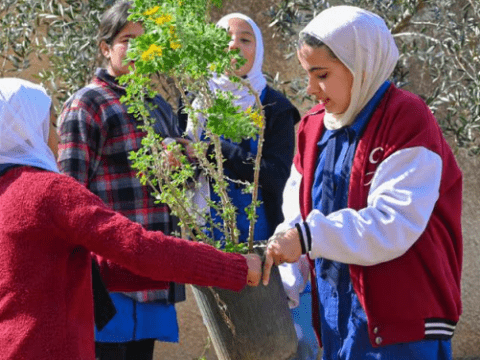World Vision flags “desperate need” for governments to fund Syria and host countries, amidst 12 years of conflict and displacement

12 June 2023 – World Vision, one of the leading NGOs working in Syria, has called on governments to “renew their commitment to those most impacted by the crisis in Syria and host countries”, ahead of the 7th Brussels Conference on Supporting the Future of Syria and the Region hosted by the European Union (EU).
The current humanitarian situation in Syria is dire, as a result of more than 12 years of conflict and the devastating earthquakes of February 6th. A rapid needs assessment conducted by World Vision following the earthquakes found that almost a quarter of respondents did not have regular access to food, and 44% reported that markets were destroyed in their neighbourhoods. 94% of respondents’ homes had been damaged by the earthquakes, with over a half of respondents’ shelters being completely destroyed.
Children in Syria have been particularly impacted, 42% of those surveyed by World Vision in Northwest Syria reported that education facilities in their community had been partially damaged or completely destroyed by the earthquakes, and 82% reported that their children’s access to education had been impacted. On top of this, children under 5 in Northwest Syria are particularly vulnerable to the spread of the disease, making up close to half (45%) of confirmed cholera cases. Families are also concerned about the earthquakes’ mental health impact on their children, with 98% of caregivers saying their boys and girls still exhibited fear, sleep disturbances and sensitivity to noise.
In host countries such as Lebanon, Jordan, Iraq and Türkiye, economic difficulties, dwindling funding and climate change have added to the hardships endured by host, refugee and internally displaced families and children over the past years. Many of them are resorting to debt and adopting negative coping mechanisms such as child labour and early marriage to make ends meet. Meanwhile, longer-term solutions that decrease vulnerable populations’ dependence on aid, while fostering further integration and social cohesion, are still needed.
Ahead of the 7th Brussels Conference, World Vision – in its latest policy brief – is calling on EU donors and the wider international community to:
- Fully fund Syria's Humanitarian Response Plan (HRP) and the Regional Refugee & Resilience Plan (3RP), and invest in longer-term development solutions for displaced, host and refugee families and children;
- Continue to involve local actors and communities in planning the humanitarian and resilience response to ensure programmes are adapted to their needs;
- Build on existing cooperation with host countries like Türkiye, Lebanon, Jordan and Iraq – who have welcomed a considerable number of Syrian refugees – to support vulnerable host communities as well as refugee families and children, and push for further integration and social cohesion opportunities where possible; and lastly
- Work towards a resolution to the protracted crisis that would safeguard the rights of the women, girls and boys most impacted by 12 years of recurring violence and displacement.
Johan Mooij, World Vision’s Syria Response Director who will be attending the conference says:
“Syria continues to be the world’s largest displacement crisis with more than 13 million people having either fled the country or been displaced within its borders since 2011. While durable solutions for refugees and internally displaced persons (IDP) were brought up during several editions of the Brussels Conference, these discussions have yet to materialize into concrete actions on the ground.
"As a result of dwindling aid and gaps in the humanitarian and resilience responses, Syrian women, girls and boys are increasingly vulnerable to protection risks that regularly expose them to various forms of exploitation and abuse. Meanwhile, they continue to miss out on essential job and learning opportunities that are key to their development and financial independence. This only perpetuates the cycle of violence, and heightens their dependence on humanitarian aid, adding to the overall cost of the humanitarian response in the longer-term.
“Donors must step up their efforts to support Syrian families and children following 12 years of conflict. This means renewing their financial commitments on a multi-annual and flexible basis, and funding continued lifesaving, protection and resilience support to achieve durable and long-term solutions for children in Syria and neighbouring host countries.”
ENDS
NOTES TO EDITOR
World Vision have been responding to the Syria crisis in Syria, Jordan, Türkiye, Lebanon and Iraq for more than a decade, where we continue to support hundreds of thousands of vulnerable host, refugee and internally displaced families, women, girls and boys with the education, protection, health, livelihoods, WASH and shelter assistance that they need to thrive.
Read World Vision's Syria 12 Policy Brief here.